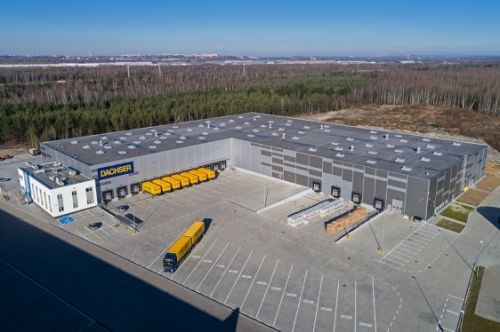Showing the way to success
Investment & finance
Tomasz Szpyt-Grzegórski, ‘Eurobuild CEE’: The Polish real estate investment market seems to have been going at full throttle for some time – and this year has been no exception. Could you tell us how Colliers International intends to take full advantage of this…
Dorota Wysokińska-Kuzdra, senior partner, director of the corporate finance department, Colliers International: Well, it’s the demand that breeds the supply, and the market needs more and more new services right now. The corporate finance department at Colliers International is not limited to debt financing. We advise on clients’ financial needs, including mezzanine financing, on raising capital and on capital partners, as well as supporting clients in the process of acquiring companies and introducing companies to the stock exchange. It could be described as soft investment banking provided by a real estate consulting company.
How has the market reacted to such a range of services?
Extremely well. This is a rather specialised niche, but it’s not the case that no one else provides such services to the market – there are investment banks, for example. However, we have enjoyed a great deal of interest due to our wide range of expertise and spectrum of services, albeit limited to the real estate market. The Polish market, and this is gradually also becoming the case in other CEE countries, is already at such a stage of development that some investors are not satisfied with having a single property – they want to invest in a company, an investment platform, or enter into various types of relations with local or regional asset managers or investment managers. As a result, the investor will not have to build a new team to supervise their investment. Instead it can take over a company to fulfil this task. Investors generally trust local teams who know the situation best. Companies in Poland have also realised that you can work with an investor or several investors in their business. You can have one investor within the office segment, another for retail and yet another for warehouses, hotels or apartments. This works if the business is going well. Our role is to help ensure that it does.
Who is setting up such businesses in Poland now, Polish or foreign investors?
This is a perennial problem for the Polish real estate investment market – it’s dominated by foreign players. There are almost no Polish investors. Although they have a choice of various forms of investment in real estate, they lack the simplest one: REITs.
Various types of exchange or crowd-funding platforms have recently been launched onto the market, with the intention of enabling smaller investors to invest in real estate. Do they have a chance of succeeding?
To some extent, they probably do. Although it’s very important to know who’s behind such a platform and what their experience is. Real estate is one of the safer sectors of the economy, but even in this case there’s no promise that an investment will turn out to be profitable. You can certainly lose money on real estate, there’s no profit guarantee, and people sometimes forget that investing involves some risk. In the case of traditional transactions, the real estate in question is important, whereas in the case of alternative platforms, the people who manage this money become more important.
Aren’t such platforms a response to the lack of investment on a regulated market?
Life abhors a vacuum. Such systems will keep on appearing until the first spectacular failure. This doesn’t mean that all such initiatives are doomed to failure. After all, we have examples of investment platforms that have been operating successfully for years. However, one can see the need for systemic solutions and legal systems that increase the investment security of the ordinary, individual, small investor.
Is the Warsaw Stock Exchange an attractive place for real estate companies to raise capital?
The main problem of the Warsaw trading floor is its low liquidity. It makes investors’ lives a misery when it comes to carrying out rapid transactions. However, if we are talking about investment in the long run, this is no longer so difficult. Especially if you invest in a good company and can expect to receive a dividend. As you can see, REITs are emerging by themselves...
How would you advise an investor who has EUR 100 mln to spend on real estate in Poland now?
You could take several paths. One of them is the promising office market, which is developing well. Personally, however, I’m a fan of alternative real estate – student halls and apartments for rent. I think that various kinds of residences for senior citizens will join this list in the near future. Student halls are doing very well right now and that should remain the case for some time. I think there’s still room for a few more serious players to enter this segment in Poland. The lack of product is so huge and the data are so encouraging right now, that this just has to be a very promising market. Another alternative – apartments for rent – is also doing very well. This growth is also being driven by the massive growth of the BPO/SSC sector.
While student halls and apartments for rent have already popped up on investors’ radars, I have the impression that the homes for the elderly segment can’t break through.
I think that we will be the first generation to use these types of services on a large scale. We have been seeing cases of some companies being ahead of the market with their products and who have failed, despite having a great product. So it’s not just location that counts in real estate – the timing is very important.
So where are we in the cycle?
This probably won’t be such an original answer: we are in the upper part in the business cycle, in it’s the final phase – and I think that some kind of correction is certainly ahead of us. However, that doesn’t mean I’m saying that this will be a serious crisis or crash. Far from it. However, it is difficult to say when this correction will happen but it will certainly take place.
Which segment of the real estate market is likely to bear the brunt of this?
The retail sector has been going through a structural transformation recently. A lot of this is due to the growth of online shopping, the development of new technology and also partly because of changing expectations and habits – using or experiencing something rather than actually having to own things has become more and more important. On the other hand, if you have a passion, say, you’re a keen cyclist, these days you want to have three different bikes, five outfits and all the latest accessories. And we spend a fortune on this. Shopping centre owners and retailers have been adapting quite quickly to the changes on the consumer side and shopping centres have generally been doing well operationally. Investors, however, have been refraining from making purchases and so there are fewer deals. This wave came from the West, where online commerce has been killing off the traditional model – such as it is doing in the UK and the US. In our part of the world, however, the retail sector is in good shape and I think that sooner or later investors will notice that there good opportunities to buy here.
Can we expect turnover similar to last year’s on the investment market this year?
The forecasts and the market consensus say so, but one big transaction would be enough to overturn the statistics. The main thing is that the investment market is currently in very good condition, so the issue of breaking the records is of secondary importance.
Will there be investors coming in from any new directions?
The Polish market is now developed and most of the key players are already present here – and we can expect them to stay. Capital from South Africa, Malaysia and Korea appeared a few years ago and continues to flow in. I think that Middle Eastern capital, which has already been present in Poland but only at the level of individual deals, may become more involved. Investors from our part of Europe are also quite active. The interest in Polish real estate is so great that I can say with some certainty that we have a few very busy months ahead of us.
Twenty years at the top
Dorota has more than twenty years of experience in real estate, finance and banking. As a senior partner and the head of the corporate finance business line she provides advice on customers’ financial needs, including debt financing, mezzanine financing, raising capital and acquiring capital partners, and also offers support in acquiring companies and entering the stock exchange. In May this year, Dorota advised on the first investment transaction in the student housing sector in Poland.
Prior to joining Colliers International, she was a senior partner at Griffin Real Estate for eleven years, where she was responsible for the group’s management and investments, and also for the first mezzanine fund operating in Poland. She was one of the creators of the logistics platform that is co-managed by Griffin. Prior to this, as CEO of Griffin Premium RE, she successfully launched the fund on the Warsaw Stock Exchange. She was a member of the team responsible for acquiring shares in Echo Investment, one of the biggest transactions on the Polish real estate market, in which she was responsible for the due diligence and the financing of the acquisition. Before joining Griffin, for over ten years, she held managerial positions in the HypoVereinsbank/UniCredit group and its subsidiaries, monitoring real estate investment banking and managing real estate.
Dorota graduated from the Warsaw School of Economics (SGH), the University of Cologne and the University of Duisburg-Essen. She also chairs the Polish branch of the Urban Land Institute – an international non-profit organisation supporting responsible planning and the sustainable development of cities. It provides a platform for the exchange of knowledge between leading experts and players in the real estate market in Poland and abroad.






















































